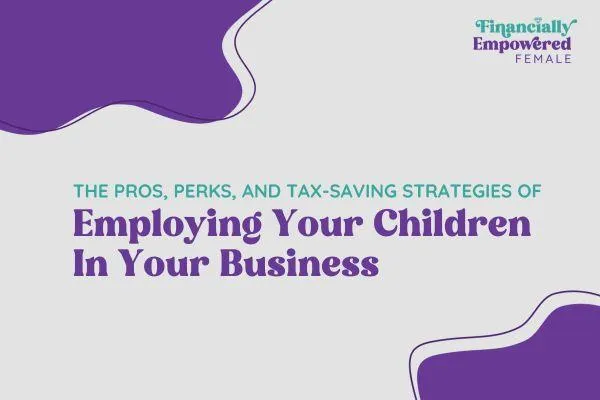OUR BLOG
Here we talk all things business and finance.
Check out our recent topics below!
Recent Blog Posts

The Pros, Perks, and Tax-Saving Strategies of Employing your Children in Your Business
In the dynamic landscape of business management, entrepreneurs are continually exploring innovative ways to optimize operations and secure long-term success. An unconventional yet increasingly popular approach is hiring one's own children within the family business. Beyond the intrinsic benefits, there are several compelling tax-saving strategies associated with employing your own children that can significantly impact your business's financial health.
With that said, here are 10 ways that employing your children could benefit your business!
1. Legitimate Employee Roles
When employing your children, ensure they are engaged in legitimate roles that contribute to your business's operations. This could include tasks such as administrative work, social media management, or customer service. By providing tangible value to the company, their compensation becomes a legitimate business expense.
2. Salary Deductions
Salaries paid to your children are tax-deductible business expenses, reducing your overall taxable income. This strategy not only allows you to allocate resources more efficiently but also provides an opportunity for your children to earn income while learning valuable skills.
3. Lower Tax Brackets
Children typically fall into lower tax brackets due to their lower incomes, resulting in reduced tax liabilities. By distributing income among family members, you can optimize your overall tax burden.
4. Contributions to Retirement Accounts
Employing your children allows them to participate in retirement savings plans, such as Individual Retirement Accounts (IRAs) or 401(k)s. This not only fosters a habit of saving early in life but also generates tax benefits through deductions or tax-deferred growth.
5. Healthcare Benefits
Offering healthcare benefits to your children, just like any other employee, can provide tax advantages. Health insurance premiums paid on behalf of your children can be deducted as a business expense, reducing your taxable income.
6. Education Assistance
If your children are pursuing higher education related to your business industry, you may be able to provide education assistance as a tax-free fringe benefit. This can include covering tuition, books, or other educational expenses.
7. Qualified Business Income Deduction (QBI)
The QBI deduction allows certain business owners to deduct up to 20% of their qualified business income. Including your children as employees may enable you to maximize this deduction, leading to significant tax savings.
8. Smooth Succession Planning
Planning for the future is a fundamental aspect of running a family business. Employing your children can facilitate a seamless transition when the time comes for you to step back or retire, ensuring the continuity of operations.
9. Summer or Seasonal Employment
If your business experiences seasonal fluctuations, hiring your children during peak seasons can provide additional tax savings. Seasonal employment aligns with business demands and offers an opportunity to reduce overall tax liabilities.
10. Professional Advice and Compliance
To ensure you are maximizing tax-saving opportunities while adhering to legal requirements, seek guidance from a qualified tax professional. They can help structure employment arrangements, manage payroll, and navigate relevant tax regulations.
Conclusion:
The IRS permits sole proprietorships and partnerships (including LLCs) that are fully owned by a child's parents to pay wages to children under 18 without the requirement to withhold payroll taxes. This strategy is a viable option for such business structures.
However, caution is advised when applying this strategy to S or C corporations. The benefit of avoiding FICA (Federal Insurance Contributions Act) taxes when paying children is not available if you have an S or C corporation. To enjoy the FICA tax avoidance benefit, the wages should be paid through a sole proprietorship or an LLC owned by the child's parents.
In essence, it is advisable to avoid paying your children out of a corporation if you wish to circumvent payroll tax withholding. To maximize the tax advantage, consider utilizing this strategy within the framework of a sole proprietorship or an LLC owned by the child's parents.
Employing your own children in your business not only offers a range of intrinsic benefits but also presents substantial tax-saving opportunities. By leveraging legitimate roles, optimizing deductions, and strategically managing income distribution, you can effectively reduce your business's tax liability while simultaneously nurturing a legacy and fostering a strong family-business dynamic. As with any tax-related strategy, it's essential to work closely with a tax professional to ensure compliance and maximize your financial advantages.
DISCLAIMER:
All content and information on this website including our programs, products and/or services is for informational and educational purposes only, does not constitute accounting advice and does not establish any kind of accounting-client relationship by your use of this website. You should consult your own tax, legal and accounting advisors before engaging in any transaction.
© Copyright 2026 Financially Empowered Female




